

IATEFL 2018: Safe Speaking Environments - What? Why? How? Published 9 April 2018 In our first post from IATEFL 2018, we’re sharing the talk from Professor of Psycholinguistics, Zoltán Dörnyei, on what exactly Safe Speaking Environments are and why you should care.

The talk looks at creating a psychological environment in the classroom which might make students’ lives easier. Zoltán says that in order to facilitate speaking in the language classroom, we need to: Assessment: Lower Stakes, Raise Retention. Assessment is a hot-button issue in today's K-12 education landscape, especially when one places the word "standardized" in front.
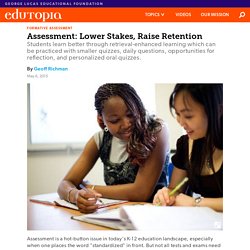
But not all tests and exams need raise hackles or blood pressure. Indeed, there is a certain kind of exam that has been shown to increase learning in the classroom without undue dread: low-stakes assessment. Make It Count: Providing Feedback as Formative Assessment. Providing students with feedback on written work can, at times, feel like a burden.
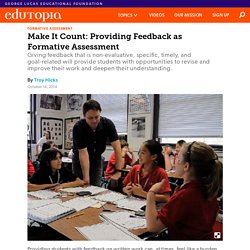
Dozens (perhaps even hundreds) of papers clutter your desk, and commenting on each is nearly impossible. Still, we know, both from our experiences and from research, that feedback is essential. John Hattie, Professor of Education and Director of the Melbourne Education Research Institute at the University of Melbourne, Australia, believes that feedback must be timely, relevant, and action-oriented.
The good news, according to Hattie, is that "students want feedback just for them, just in time, and just helping nudge forward. " To that end, he encourages us to "worry more about how students are receiving your feedback . . . than increasing how much you give. " Evaluating speaking. For example, speakers need to pronounce individual sounds clearly, understand the functions of language, and follow the conventions of turn-taking. The second part of this article looks at whether these different elements can be evaluated formally, and what ways there are to do this.
In the third part of this article we will look at how these competencies can be evaluated, with specific discussion of the IELTS speaking test. What speakers do Phonological features of speech Following the rules of language Paralinguistic devices Communicative functions Social meaning Conclusion What speakers do Speaking is a complex act with many different elements interacting to produce effective communication. Testing and assessment. It was all made worse by the fact that the chemistry teacher read the results to the whole class, from first to last place.
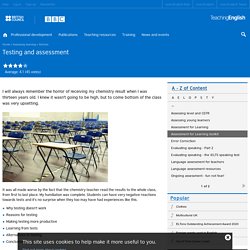
My humiliation was complete. Students can have very negative reactions towards tests and it's no surprise when they too may have had experiences like this. Why testing doesn't work Reasons for testing Making testing more productive Learning from tests Alternatives to testing Conclusions Why testing doesn't work There are many arguments against using tests as a form of assessment:
Council of Europe Language Policy Portal. Languages are a fundamental aspect of people’s lives and the democratic functioning of society.
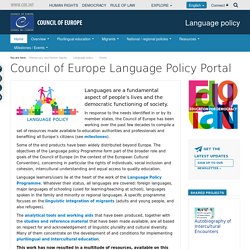
In response to the needs identified in or by its member states, the Council of Europe has been working over the past few decades to compile a set of resources made available to education authorities and professionals and benefiting all Europe’s citizens (see milestones). Some of the end products have been widely distributed beyond Europe. Inclusive assessment approaches. The comments below highlight some of the problems for teachers when thinking about learners with SENs and assessment. 'I think there is a learner in my class with SEN but I’m not sure, because I don’t know what I should be looking for and I don’t know what to do next. I probably should talk to the parent but don’t know how.’ TeachingEnglish. 4.14 primary writing sample formatted. Step 4.14 correction codes primary writing correction. Step 4.14 correction codes adult writing correction. 4.12 writing assessment criteria. Vocabulary.com - Learn Words - English Dictionary.
Recap – edshelf. Recap is a free student video response and reflection app developed by the makers of Swivl.
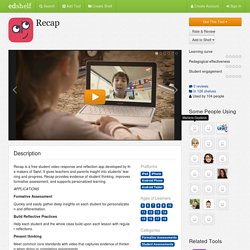
It gives teachers and parents insight into students’ learning and progress. Recap provides evidence of student thinking, improves formative assessment, and supports personalized learning. Formative Assessment Quickly and easily gather deep insights on each student for personalization and differentiation. Build Reflective Practices Help each student and the whole class build upon each lesson with regular reflections. Present thinking.
Diagnostic Questions. Developing a European Language Portfolio (ELP) Portfolios in ELT. A brief history of European Language PortfoliosWhat are Language Portfolios?
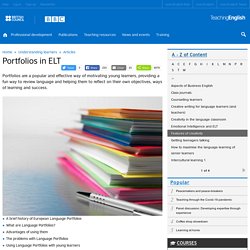
Advantages of using themThe problems with Language PortfoliosUsing Language Portfolios with young learners A brief history of European Language PortfoliosTeachers and learners have been working with Language Portfolios since the mid 1990s, and between 1998 and 2000 various ELP models were piloted in Europe. There has been much literature written about them and there are lots of interesting examples. Foreign Language Teaching Methods: Writing. Portfolio Assessment A somewhat newer approach of evaluation is the writing portfolio.
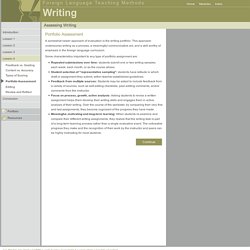
This approach underscores writing as a process, a meaningful communicative act, and a skill worthy of emphasis in the foreign language curriculum. Some characteristics important to any type of portfolio assignment are: Repeated submissions over time: students submit one or two writing samples each week, each month, or as the course allows.Student selection of "representative sampling": students have latitude in which draft or assignment they submit, within teacher-established guidelines.Feedback from multiple sources: Students may be asked to include feedback from a variety of sources, such as self-editing checklists, peer-editing comments, and/or comments from the instructor.Focus on process, growth, active analysis: Asking students to revise a written assignment helps them develop their writing skills and engages them in active analysis of their writing.
Sign in - Plickers. 4.11 speaking assessment criteria. 4.10 speaking assessment plan. 4.10 speaking assessment materials formatted. 4.9 speaking assessment live vs recorded samples. 4.6 analysing test questions formatted. 4.6 Task analysing test questions NEW. 3.16 inclusion checklist.
3.9 commentary formatted. 3.9 lesson materials formatted. TfS landL wk 3 Examples of differentiated tasks. EO D Learner Materials, Secondary. EO D Learner Materials, Primary. Pronunciation articles. Phonemic chart. Vocabulary activities. Checking Understanding. Analysis of the language consists of two sub-stages, often known as highlighting and concept checking.
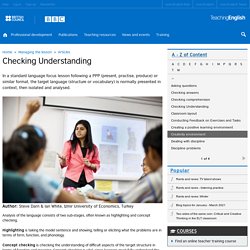
Highlighting is taking the model sentence and showing, telling or eliciting what the problems are in terms of form, function, and phonology. Concept checking is checking the understanding of difficult aspects of the target structure in terms of function and meaning. Concept checking is vital, since learners must fully understand the structure before any intensive practice of form and phonology is carried out. Ways of checking understandingConcept questionsSome examplesLearning to construct concept questionsConclusion Ways of checking understanding Concept checking is normally achieved by the use of a set of questions designed to ensure comprehension of the target language, raise awareness of its problems, and to indicate to the teacher that the learners have fully understood.
The question 'Do you understand? ' Time lines to establish tenses. TeachingEnglish. Kids and songs. Learning and learners 2.13 Pronunciation activities. Learning and learners 2.12 A menu of practice activities. Learning and learners 2.11 Language practice activities from video. Total physical response - TPR. Where is it from?

How can I use it in class? When should I use it? Why should I use it in the classroom? Grammar reference. English Grammar reference. Learning and learners 2.5 Example language analysis sheet. Learning and learners 2.5 Blank language analysis sheet. Who needs resources? What type of lessons would this include The following types of lessons would use minimal or no resources, and the students would have to produce most of it using their creative minds and using the teacher as a go-between. The only problem is whether or not you can maximise their potential. Lessons Worth Sharing. Self-access course for professionals. Improve your ability to find and apply for the right jobs, develop your interview skills and learn how to perform in the workplace with confidence.
At each level, tutor videos and workplace scenarios guide you through the materials, explain key language and grammar points and give you vocabulary that you can use in everyday business life. Subscription overview. Adapting materials for mixed ability classes. In these cases it’s important to remember that all students will get something out of the class, but not necessarily the same things, and not necessarily what you aim to teach them! For example, the beginners may begin to get a grasp of your classroom language whilst the stronger students may begin to be able to put a new tense into use. Adapting materials for mixed ability classes can take different forms.
One way to adapt materials is to rewrite reading texts and grade the language accordingly for different levels. In an ideal world where a teacher has all the time in the world to prepare their classes this may be the perfect solution. However, the reality is that this sort of adaptation is extremely time consuming and not many teachers can actually go to this length to adapt materials for mixed level groups. These ideas are taken from a workshop I attended last year on mixed ability classes. Tips for good classroom management with mixed ability groups. Motivating speaking activities for lower levels. TeachingEnglish. R is for Rapport. As part of my job on the New School MA TESOL program, I’ve been collating evaluations of the last semester’s online courses. What really stands out are the extremely positive ratings of the teaching faculty: not surprising perhaps, given their collective expertise, but when you consider that the students never actually see their instructors, such positive evaluations are quite remarkable.
Here’s a sample: The instructor’s ability to motivate the students was a key ingredient to making this course successful.Great instructor, sensitive, effective with helpful comments throughout the course. And always available by email if I had a question.This was an excellent course because the professor was extremely involved, helpful and articulate.I cannot praise this instructor enough. He was infinitely patient with my questions, frustrations and problems. But what is this thing called rapport? Instead of teaching, I told stories. ‘They have teachers all figured out. TeachingEnglish. Motivating students and teachers' role in inducing them to learn English. Reflective teaching: Exploring our own classroom practice. Proverbs and Idioms. Proverb: ‘a short saying in general use, held to embody a general truth’ Learning and learners 1.12 More speaking activities. Learning and learners 1.6 Getting to know you activities.